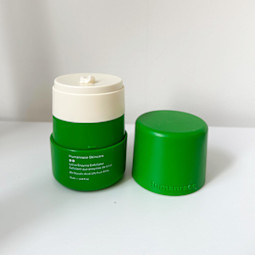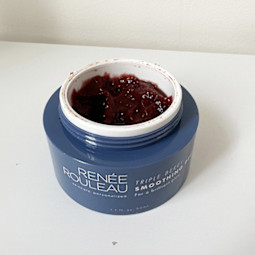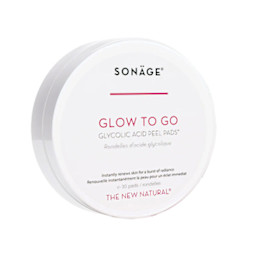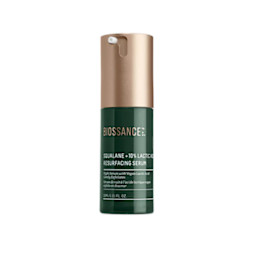The 14 Best Face Exfoliators Of 2025 For Every Single Skin Type & Goal

Best face exfoliators:
- Best for sensitive skin: Tata Harper SUPERKIND Radiance Mask
- Best for aging skin: Savor Beauty Pumpkin Enzyme Peel
- Best for acne-prone skin: Paula's Choice Skin Perfecting 2% BHA Liquid Exfoliant
- Best hydrating: Augustinus Bader The Essence
- Best brightening: Humanrace Lotus Enzyme Exfoliator
- Best mask: Renée Rouleau Triple Berry Smoothing Peel
- Best cleanser: Current State Salicylic + Green Tea Exfoliating Cleanser
- Best peel pad: Sonäge Glow to Go Glycolic Acid Peel Pads
- Best toner: Alpyn Beauty Pore Perfecting Liquid with 2% BHA + Borage
- Best for oily skin: Hero Cosmetics Pore Purity
- Best for combination skin: Shani Darden Skin Care Triple Acid Signature Peel
- Best serum: DWB Beauty Exfoliation Night Resurfacing + Brightening Serum
- Best physical scrub: Tatcha The Rice Polish Foaming Enzyme Powder
- Best for dry skin: Biossance Squalane + 10% Lactic Acid Resurfacing Serum
Did you know that you naturally shed between 30,000 and 40,000 dead skin cells every minute? Your skin is in a constant cycle of turnover and rebirth—pretty neat, if you ask me.
However, factors like weather, lifestyle, skin care products, age, and dehydration can slow down or halt this process, which can result in dull, flaky, congested skin over time.
To literally take matters into your own hands, might we recommend one of these face exfoliators? Here, you’ll find the best options to slough your complexion smooth (ahem, without wrecking your skin barrier).
mbg's picks for the best face exfoliators
Best for sensitive skin: Tata Harper SUPERKIND Radiance Mask
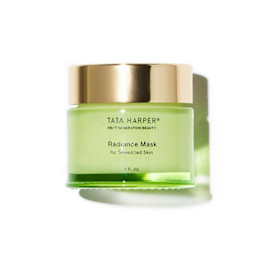
Pros
- Fragrance-free
- Features self-neutralizing AHAs to minimize irritation
- Contains prebiotics
Cons
- Pricey for a smaller jar
Key ingredients:
White kaolin clayLactic acidPhytic acidType:
ChemicalForm:
MaskEven as someone who doesn’t have sensitive skin, I find myself gravitating towards Tata Harper’s essential oil-free Superkind line. Trust: These products may be gentle, but they deliver ultra-glowy results. This creamy mask features self-neutralizing AHAs, along with white kaolin clay to delicately unglue dead skin cells and absorb excess oil.
What does “self-neutralizing” mean, you ask? Well, after you apply the mask and let it set for the allotted 20 minutes, the AHAs actually stop working—so you don’t have to worry about leaving it on for too long and risking irritation. Feel free to marinate as long as you like.
What our tester says
“Perhaps one of my favorite masks of all time, this lush formula is a delight. It's slightly enzymatic, decadently hydrating, and seriously brightening. When I'm lucky enough to have a jar, I use it once a week—and take advantage of every last drop. I recommend it to everyone I know.” — Alexandra Engler, mbg beauty director
Best for aging skin: Savor Beauty Pumpkin Enzyme Peel
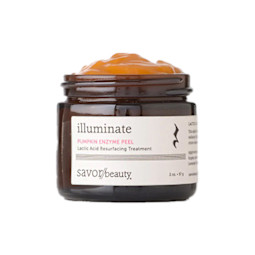
Pros
- Great for sensitive skin
- Contains certified organic pumpkin puree
Cons
- Strong pumpkin spice smell, if you don’t like pumpkin
Key ingredients:
Lactic acidGluconic acidPumpkin pureeType:
ChemicalForm:
MaskMature skin also tends to be on the drier and sensitive side, so gentle acids have their place here, too. Great news: This Savor Beauty mask includes lactic acid and gluconic acid, which are two of the best chemical exfoliants for fragile skin. The former is an AHA that doesn’t penetrate as deeply as others. The latter is a polyhydroxy acid (PHA), which has an even larger molecular structure than AHAs and BHAs, so it’s super gentle on the skin.
Not to mention, this PHA also functions as a humectant, which means it simultaneously draws water into the skin, making it instantly appear more firm and plump. As if that wasn’t enough, the formula also relies on pumpkin enzymes to brighten and smooth the complexion.
What our tester says
“This formula was practically made for me. It's for those with sensitive skin, but are starting to see signs of aging. (It's a tough balance! You want to be proactive with fine lines, but you certainly don't want to be too aggressive to the point of irritation.) This blends together lactic acid, pumpkin enzymes, and gluconic acid (which helps with collagen). The result is smoother, happier skin.” — Engler
Best for acne-prone skin: Paula's Choice Skin Perfecting 2% BHA Liquid Exfoliant

Pros
- Works quickly
- Makes pores appear smaller
- Evens skin tone
Cons
- Contains butylene glycol, which can be irritating for some
Key ingredients:
Salicylic acidGreen teaType:
ChemicalForm:
TonerIt’s a cult-favorite for a reason: The 2% salicylic acid exfoliator works hard to unclog pores and balance the skin’s sebum levels, resulting in a brighter, smoother complexion. Salicylic acid is top notch for acne-prone skin, as the oil-soluble BHA can shimmy its way deep inside the pores and unclog them at the source. I will say that a little bit of this solution goes a long way—some people have experienced irritation when used in excess—but you’d be surprised by how smooth your skin looks after just a few swipes.
What our tester says
“There's been an obvious improvement in my overall complexion that goes beyond breakouts. I feel like my skin absorbs other products better, likely due to the reduction in excess oil. My tinted moisturizer also glides on easier, and I don't have to powder away the appearance of my pores.” — Braelyn Wood, mbg deputy commerce editor
Pros
- Gentle enough to use every day
- Soothing & hydrating
- Great for aging skin
Cons
- Pricey
Key ingredients:
Phytic acidGluconic acidSalicylic acidTFC8Type:
ChemicalForm:
TonerThis essence is so hydrating, it’s easy to forget it has exfoliating properties, too. The brand calls it a 3-in-1 formula that functions like a gentle exfoliant (powered by phytic, gluconic, and salicylic acids), a purifying toner, and a refreshing essence that floods the skin with antioxidants. Of course, it also features the signature Trigger Factor Complex (TFC8), composed of amino acids, vitamins, and synthesized molecules to promote cellular regeneration.
What our tester says
When an exfoliator feels this hydrating, I have to intentionally keep myself from slathering it on every single day (admittedly, I have overwhelmed my skin barrier time and again). However, this essence is so gentle and hydrating that I actually can use it every day if I wanted to. My skin feels soft and smooth with zero irritation—in fact, the formula actually calms my redness and leaves me glowing.
Pros
- Refillable packaging
- Creamy & gentle
- Contains non-abrasive granules
Cons
- Glycolic acid may be too strong for some
Key ingredients:
Lactic acidRice particlesFruit enzymesGlycolic acidType:
PhysicalChemicalForm:
MaskPhysical exfoliators are great for an immediate glow—they contain small particles to manually lift and remove dead skin cells, whereas it takes a bit of time for a chemical exfoliator to promote cell turnover. That’s what makes this mask so effective for skin-brightening: It contains gentle rice particles to physically slough away dead skin, as well as glycolic acid and lactic acid to unglue those bonds. Finally, you’ll find pomegranate, pumpkin, and papaya enzymes to rid dead skin cells at the surface. I personally love a good enzyme mask—consider this one supercharged.
What our tester says
As someone who routinely tests a bunch of products, I really appreciate the mask format. See, with a serum or toner, it’s easy for some (well, me) to over-exfoliate. “With a mask, you use it up to three times a week and will not go overboard,” board-certified dermatologist Elena Jones, M.D., chief dermatologist of Humanrace, once told mbg. And my partner has officially stolen this one from me—it’s that good.
Pros
- Smells amazing
- Works quickly
- Great for congested, dull, or aging skin
Cons
- Might be too strong for some
Key ingredients:
Lactic acidPhytic acidMandelic acidMalic acidTartaric acidGlycolic acidType:
ChemicalForm:
MaskThis mask is jam-packed with skin-resurfacing AHAs—like glycolic, lactic, mandelic, malic, phytic, and tartaric—as well as gluconic acid, a lovely PHA that simultaneously hydrates. You’ll also find an ingredient called potassium azeloyl diglycinate, which is a derivative of azelaic acid and superb for fading hyperpigmentation.
Like its name suggests, the mask includes plenty of berry extracts to brighten the skin and provide antioxidant protection. Not for nothing, it looks, feels, and smells just like strawberry jam, so much so that you may even be tempted to take a bite. (Please don’t, but really, the sensorial experience is unmatched!)
What our tester says
Any time my skin looks a little meh, I bring out this peel. Instantly, my complexion looks 10x brighter, smoother, and more even-toned. I will say, she’s a strong one—those with sensitive skin might want to proceed with caution. But if you can handle most at-home chemical peels, you should be A-OK.
Best cleanser: Current State Salicylic + Green Tea Exfoliating Cleanser
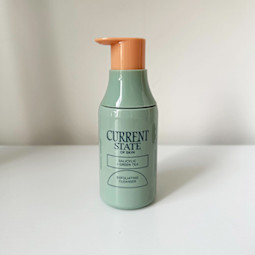
Pros
- Budget-friendly
- Can use every day
Cons
- Some reviewers don’t like the scent
Key ingredients:
Lactic acidSalicylic acidGreen teaMalic acidTartaric acidGlycolic acidType:
ChemicalForm:
CleanserExfoliating cleansers can be tricky: You want one that effectively unclogs pores and reduces excess oil without stripping your barrier. (If you’re left with a tight feeling post-cleanse, that’s a surefire sign your barrier is begging for a different product.) This cleanser certainly fits the bill in terms of efficacy—it contains 2% salicylic acid, plus a handful of fruit-derived AHAs to smooth congested skin—but with green tea, aloe vera, and gentle, coconut-derived surfactants, it won’t ever leave you feeling dry.
What our tester says
I love, love, love a salicylic acid cleanser. Especially for those prone to over-exfoliating (ahem, raises hand), it’s something you can use every day without fear of irritation and still get that lovely skin-sloughing sensation. Not to mention, this formula has green tea to soothe any redness you may face; if you have textured skin, this formula is a must (use it in the shower, and thank me later.) Just make sure you don’t incorporate any other exfoliants in your routine if you do use this cleanser—you still don’t want to overdo it.
Pros
- Easy to use
- Leaves a satisfying tingle
- Great for pigmentation
Cons
- May be too potent for some
Key ingredients:
Glycolic acidType:
ChemicalForm:
PadOh, the mighty peel pad. They’ve come a long way from the alcohol-soaked circular pads that may have left your skin stinging back in the day. No, these glycolic acid-infused beauties come buffered with coconut milk and glycerin to simultaneously soothe and hydrate. Glycolic acid is still pretty potent, so those with sensitive skin may want to take caution, but these pads are a great option for those who love a simple swipe-and-go.
Best toner: Alpyn Beauty Pore Perfecting Liquid with 2% BHA + Borage

Pros
- Very hydrating & gentle
- Wild-crafted ingredients
Cons
- ome people might want a stronger product
Key ingredients:
Salicylic acidBorage extractTremella mushroomType:
ChemicalForm:
TonerI would consider this toner the plant-based version of the Paula’s Choice famous 2% BHA toner (which also made this list!). Thanks to the 2% salicylic acid, it helps dissolve excess oil and dead skin cells, yet anti-inflammatory borage extract and hydrating tremella mushroom mean it won’t ever strip the skin. Like all of Alpyn Beauty’s offerings, the plants in this formula are wild-crafted—meaning, they’re harvested from their natural ecosystem (rather than on a farm) and extra-resilient against environmental stressors.
What our tester says
As I previously wrote for Talk Of The Team, I wasn’t surprised to fall in love with Alpyn’s exfoliator. It really is one of the most gentle leave-on treatments I’ve used—not even a tingle. But my skin definitely looks brighter and more even-toned the next morning, so I can tell it’s working.
Pros
- Great for multi-masking
- Non-drying
- Keeps acne at bay
Cons
- Not the best option for fine lines or skin aging concerns
Key ingredients:
Bentonite clayKaolin claySulfurType:
ClayForm:
MaskClay masks receive a bad rap—many can be super-drying and make the skin feel so tight that it’s difficult to even smile or speak while you wear it. This is not one of those clay masks. It contains kaolin and bentonite clays to absorb excess oil and draw impurities from the pores, but the spirulina and fermented sea kelp extracts keep it hydrating and soft. It also contains sulfur, which "helps with oily skin as it can help with the overproduction of sebum,” Ife J. Rodney previously told mbg. Leave it on for 10 minutes, splash with water, and it instantly melts into a creamy foam.
What our tester says
True to its claims, this clay mask feels deliciously creamy on the skin. Seriously, no tugging or tightness! That’s a victory in my eyes, as I usually avoid proper clay masks for that very reason. I have combination skin, so I apply only on my T-zone where I accrue the most oil—it has done wonders to balance my complexion. (And for especially stubborn spots, I’ll always slap on a Mighty Patch.)
Pros
- Great for an immediate glow
- Fades dark spots
Cons
- Pricey for 8 treatments
Key ingredients:
Lactic acidMandelic acidGlycolic acidBentonite clayKaolin clayType:
ChemicalClayForm:
MaskEsthetician Shani Darden is known for prepping celebrity clients before they hit the red carpet—so she launched the perfect exfoliator to achieve those results at home. The biweekly treatment includes a gentle chemical peel featuring lactic, glycolic, and mandelic acids, as well as a neutralizing mask with kaolin and bentonite clays to calm the skin and refine pores.
What our tester says
As someone with textbook combination skin (read: oily on the T-zone and perpetually dry everywhere else), this is a fabulous option to really target congested areas without stripping your whole complexion. The two-step treatment does take more time than your average peel, but I enjoy nourishing my skin with the cooling clay mask immediately after—this at-home experience really feels like a treat.
Pros
- Refillable packaging
- Great for fine lines & large pores
- Nourishes the skin microbiome
Cons
- Pricey
Key ingredients:
Lactic acidGluconic acidSalicylic acidGlycolic acidType:
ChemicalForm:
SerumCalling all fans of skin cycling: Why not kick off exfoliation night from the derm who coined the term? This potent-yet-gentle serum contains AHAs, BHAs, and PHAs to thoroughly resurface skin without stripping it raw. It also comes fortified with postbiotics to simultaneously strengthen the skin barrier, so you can consider it a hero for pretty much any skin concern (acne, dark spots, fine lines, etc.).
What our tester says
“The superstar derm has done it again! I love anything from Dr. Bowe, and this serum just adds to the list. In the powerful formula you'll find glycolic acid, lactic acid, salicylic acid (the big three as I call them)—alongside postbiotics to nurture the biome. An absolutely stacked formula.” — Engler
Best physical scrub: Tatcha The Rice Polish Foaming Enzyme Powder

Pros
- Doesn’t disrupt the skin barrier
- Transforms into a creamy foam
Cons
- You must activate it each time with water, which could get messy
Key ingredients:
Rice powderPapaya enzymesHydrolyzed silk proteinType:
PhysicalChemicalForm:
ScrubOK, on a scale of superfine granules to harsh walnut shells, this face polish certainly falls in the former camp. Some might not consider it a “scrub” at all, but I’d argue that’s a good thing! You have to be very careful when using scrubs so that they don’t create microtears and wreck your skin barrier.
And Tatcha’s Rice Polish remains a gentle cult-favorite for a reason: It features Japanese rice powder, created through a special milling process to grind it extremely finely. The tiny granules gently buff away dead skin, while papaya enzymes work to remove dead skin cells from the topmost layer. Once emulsified with water, it easily lathers up into a dreamy foam.
What our tester says
This is my go-to exfoliator during the summer when I need a little extra help clearing my pores of sweat. I love how clean and supple my skin feels after using it—and thanks to the manual exfoliation, I notice an immediately brighter glow. There’s no water in the formula (you have to activate the powder with water each time you use it), so it has lasted me a very long time. A great investment, I’d say!
Pros
- Equally hydrating and exfoliating
- Contains a gentle AHA
- Lightweight & non-greasy
Cons
- Contains essential oils, if you’re sensitive to those
Key ingredients:
Lactic acidSqualaneCloverType:
ChemicalForm:
SerumSqualane is a godsend for dry skin. "It is used as an emollient in skin care, which maintains the skin's moisture barrier and hydration," says board-certified dermatologist Rachel Nazarian, M.D., of Schweiger Dermatology Group in NYC. It’s also what makes this lactic acid exfoliator oh-so creamy, infusing the skin with moisture as the gentle AHA sloughs off dead cells. Apply this serum during your evening routine, and trust, you’ll be greeted by impossibly radiant skin come morning.
What our tester says
“An overnight treatment that puts in the work. Layer this potent lactic acid number under a hydrating cream and I promise you that you'll wake up with glowing skin. The brand's signature squalane also helps buffer any irritation, given 10% lactic acid can be a lot for some folks.” — Engler
Comparing the best face exfoliators
How we picked
- Variety: Physical, chemical, enzyme, clay—you’ll find every type of exfoliator on this list.
- Form: Some love an exfoliating face wash, while others prefer a leave-on serum or toner. We made sure to include a wide range of products here.
- Skin concern: Some exfoliants are better suited for fine lines, acne, pigmentation, and so on. No matter your specific skin concern or goal, you’ll be sure to find a quality exfoliator to match.
- Testing & testimonials: Everything on this list comes recommended and tested by trusted professionals and editors. We also used real customer reviews to inform our choices.
How to choose a face exfoliator
Before picking an exfoliating product, it’s important to understand which type of exfoliation suits you best. Consider the below your mini exfoliation guide:
Physical
Physical exfoliators contain small particles to lift and remove dead skin cells. (Think: salt, sugar, jojoba beads, or crushed grains and seeds.) Because you manually massage these into your face, they’re often associated with a more immediate glow—but you have to be careful not to scrub too hard or use something too abrasive.
“Physical exfoliators can be harsh and create microtears in the skin, especially if the exfoliating medium doesn't dissolve or is irregularly shaped,” says board-certified dermatologist Geeta Yadav, M.D., founder of FACET Dermatology. “But I do understand how satisfying it can be to use a physical scrub!” That said, the best candidate for physical exfoliation is someone with textural concerns or those looking for an immediate hit of brightness.
Chemical
Chemical exfoliants, however, use naturally exfoliating acids (AHAs, BHAs, or PHAs) to gently dissolve dead skin cells. “Chemical exfoliants break down the bonds between the skin's surface and the dead cells to help them shed naturally, or help break down the dead skin and oil within pores to unclog them,” says Yadav.
You can read about the differences between AHAs and BHAs here, but generally, AHAs are best suited for those with pigmentation or aging concerns (like sagging and fine lines), while BHAs penetrate deep into the pores and break up oil buildup at the source (so they’re best for oily and acne-prone skin).
“Most people do well with alpha-hydroxy acids, especially those with larger molecule sizes like lactic acid (which is best for sensitive skin as it doesn't penetrate the skin as deeply, making it less likely to cause irritation), though many people can and do comfortably use glycolic acid,” Yadav adds.
Enzyme
Finally, we have enzymes. These are tiny molecules found in fruits (think pumpkins, cherries, and papaya), and technically, they’re chemical exfoliants, as they help unglue dead skin cells. However, they get rid of dead skin cells at the surface of the skin; they don't exactly promote cell turnover for living cells underneath.
That said, enzymes tend to be less abrasive on the skin, as they don't penetrate as deeply into the pores. "Enzymes are great for sensitive skin since they work to break down the proteins found in dead skin cells but do not cause any cellular death or turnover like acids do," double-board certified surgeon Melynda Barnes, M.D., once explained to mbg.
Tips for exfoliating your face
Ready to scrub? See below for the best derm tips and warnings.
Prep the skin
“Your face should be clean,” says Yadav. “Other than that, follow the manufacturer's instructions—some exfoliants should be used on wet skin, while others should be used on dry skin.”
For example, you need to use a scrub on wet skin in order to work the product into a lather; serums and masks, on the other hand, should go on clean, dry skin so the actives have an easier time penetrating the pores.
Use acids at night
You can get away with a gentle face scrub or enzyme mask during the day, but generally, you’ll want to use exfoliating acids (AHAs and BHAs) at night. These ingredients can make your skin more photosensitive, which is why experts recommend incorporating them into your evening regimen. Of course, you should also protect your skin during the day with SPF.
Moisturize afterwards
Exfoliation without hydration is a recipe for a weakened skin barrier. After you slough off dead skin, you'll want to follow up with a quality hydrator. Not to mention, keeping the skin aptly moisturized helps to avoid dead skin cells from accumulating in the first place.
Feel free to browse these face creams for top-notch barrier support.
Don’t go overboard on actives
Do not layer on a retinol (or any other harsh active) after exfoliating! Not only can it lead to irritation, but the ingredients may also inactivate each other. Always stick to gentle, hydrating serums and moisturizers post-exfoliation—even if you only use an exfoliating cleanser.
How often should you exfoliate?
Yes, there is such a thing as too much exfoliation. "If you use too harsh of an exfoliant and too often, you will strip, irritate, and damage your skin instead of helping it,” board-certified dermatologist Flora Kim, M.D., FAAD, tells mbg about exfoliation routines.
As a general rule: Less is more. Start slow, and work your way up to a regular cadence as tolerated. If you need a specific schedule to follow, "Most people with normal or combination skin can get away with twice or even thrice-weekly exfoliation," says board-certified dermatologist Raechele Cochran Gathers, M.D. "Those with more mature, dry, or sensitive skin may only want to exfoliate weekly."
FAQ
Do you exfoliate your face wet or dry?
“Most chemical peels are designed to be used on dry skin,” says Yadav. In fact, using them on damp skin may even render them ineffective.
However, “Most face scrubs are designed to be used on wet skin, which will help the scrub break down while giving it some slip” she adds, which makes it less harsh overall. “If you want a slightly coarser scrub, you can try a physical exfoliant on dry skin before moistening your fingertips to complete your routine, but I'd only recommend doing this with exfoliant that uses jojoba beads or another dissolving exfoliant, so as not to harm your skin.”
How often should I exfoliate my face?
“Most people with normal or combination skin can get away with twice or even thrice-weekly exfoliation," says board-certified dermatologist Raechele Cochran Gathers, M.D. "Those with more mature, dry, or sensitive skin may only want to exfoliate weekly."
We suggest reading our full exfoliation guide to craft your own perfect cadence.
How do you exfoliate with rosacea?
“Azelaic acid is a good choice for those who have rosacea,” Yadav notes. “It's not as powerful of an exfoliant as other ingredients, but that's a good thing—those with rosacea-prone skin are easily sensitized by most exfoliants. It's not an AHA or BHA but a dicarboxylic acid, and it's often derived from grains”
Plenty of derms (Yadav included) often prescribe it to rosacea patients as a helpful treatment. “It can help soothe and calm the redness while reducing the bumpy texture associated with rosacea,” she adds.
What type of exfoliant is best?
It all depends on your skin type and goals. Most people do well with AHAs or enzymes, as those are well suited for even sensitive skin. However, those with oil- or acne-prone skin may want to opt for BHAs to unclog pores.
The takeaway
No matter your skin type, ingredient preferences, or overall complexion goals, there’s an exfoliator out there waiting for you to slather on. If you’re looking for a gentle scrub, you can’t go wrong with Tatcha’s Rice Powder. Those with sensitive skin might want to try an enzyme formula, like Tata Harper’s SUPERKIND Radiance Mask. And of all the clay confections I’ve tried, nothing remains as hydrating as the Pore Purity from Hero Cosmetics.
Just remember to read the directions on your specific product, and never use body exfoliators on the face (or vice versa). If it’s a body polish you’re after, take a peek at these skin-softening picks.



